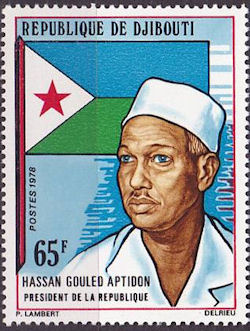Djibouti - Politics
Djibouti gained independence in 1977. On 8 May 1977, the people of the French Territory of the Afars and the Issas overwhelmingly voted for independence through a national referendum. On 27 June 1977, the Republic of Djibouti became an independent state. The constitution split power between the Issas and Afars; Hassan Gouled Aptidon was elected president and Ahmed Dini became prime minister.
The pronounced official "tilt" in Djibouti's proclaimed neutrality in favor of Somalia during all the months of the war was one of the root causes of the ethnic violence which all but shattered Djibouti's fragile political and governmental institutions in the final months of 1977. The Somalis in Djibouti's population, from the President on down, could not understand why anyone would oppose the efforts of the Somalis in the Ogaden to secure freedom from the Ethiopians. The Afars, on the other hand, saw any effort which increases Somali influence in djibouti, including the welcome given the large numbers of ethnic Somali refugees from the rail line in Djibouti, as a direct threat to their continued existence as an ethnic group.
At independence, the government opted to keep one official political party in order to prevent disintegration along tribal affiliations. The RPP was born in March 1979 and Hassan Gouled Aptidon, who was President of the Republic at that time, was elected its first President. Since its inception, one clan -- the Issas -- have completely dominated the RPP. In reaction, the second largest ethnic group -- the Afars -- formed their own political party, the &Front pour la Restauration de l,Unit8 (FRUD). The political climate became so tense that it culminated in civil war from 1991 to 1994.
Hasan Gouled Aptidon
 Hassan Gouled Aptidon (an Issa-Somali) remained in charge from the time of independence in 1977 until he opted to step down in 1999. He established a one party state dominated by the Rassemblement Populaire pour le Progres (RPP).
Hassan Gouled Aptidon (an Issa-Somali) remained in charge from the time of independence in 1977 until he opted to step down in 1999. He established a one party state dominated by the Rassemblement Populaire pour le Progres (RPP).
In early 1992, the government decided to permit multiple party politics and agreed to the registration of four political parties: FRUD, National Democratic Party (PND), Democratic Renewal Party (PRD), and People’s Rally for Progress (RPP). RPP. RPP was formed in March 1979. In late 1981, the National Assembly decreed it the sole legitimate party. It maintained its status until 1992 when the constitution was rewritten to legalize multiple political parties. It has been the ruling party since its inception and is now led by President Ismail Omar Guelleh.
Founded in 1991 by a merger of three militant Afar groups, FRUD advocates fair ethnic representation in Djibouti’s government. It initiated an armed insurgency in November 1991, which led to a civil war. Before the war ended, FRUD split into two factions, one of which negotiated a settlement with the government of Djibouti and became a legal political party. The group's leaders were President Ali Mohamed Daoud and Secretary General Ougoureh Kifleh Ahmed. Ahmed Dini Ahmed leads the second faction, which favors a continuation of military operations. Ibrahim Chehem Daoud established a splinter group, FRUD-Renaissance, in 1996.
Founded in 1992, PRD seeks to establish a democratic, parliamentary government. It is led by Abdillahi Hamarateh. PND. Founded in 1992, PND seeks a national unity government to supervise implementation of democratic reforms. Robleh Awaleh Aden leads this group.
Djibouti’s non-registered movements include the Movement for Unity and Democracy (MUD); United Front of the Djibouti Opposition (FUOD); and Opposition Djiboutienne Unifiee (ODU).
|
NEWSLETTER
|
| Join the GlobalSecurity.org mailing list |
|
|
|

